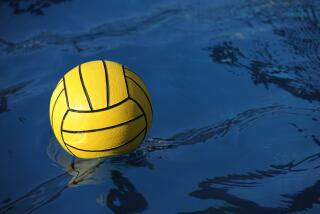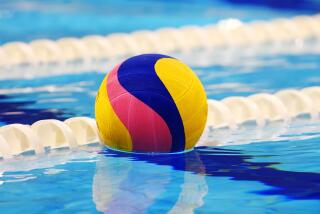Villa carries a city’s hopes
- Share via
To her coach, Brenda Villa is the “Wayne Gretzky of women’s water polo.”
To her teammates, Villa is the inspirational captain of the top-ranked U.S. national squad that is preparing for the 2008 Beijing Olympics.
To the city of Commerce, Villa is the public face of a predominantly Latino community that most Southern Californians associate with a casino.
Carrying the Olympic dreams of her team, her hometown and her country is a daunting task, even for Villa’s broad and powerful shoulders. Then again, she has grown accustomed to lofty expectations ever since she began competing at age 8.
Just check out Villa’s resume. High school champ? Check -- when Villa was a gender-busting member of the Bell Gardens High boys’ team. College champ? Yep, after she led Stanford to the NCAA title in 2002. World champion? Uh-huh, in 2003 and 2007. U.S. Olympian? Twice, in 2000 and 2004.
“Brenda’s one of the best water polo players in the world,” said national team Coach Guy Baker. “She’s our leader in the water because she makes great decisions. We want the ball in her hands.”
Baker, who has coached Villa for the last 10 years, knows that she burns to fill that one missing line on her resume. The U.S. won silver at the 2000 Olympics and bronze in 2004. No small feat but also no gold medal. That omission seems to drive the fiery competitor within Villa, who boasts a small tattoo of the five interlocking Olympic rings on her right foot. Now 28, she has put her life on hold to shoot for the gold in August.
Villa says that she welcomes the pressure of the chase. “If the media wants to phrase it like, ‘Are they going to win the gold or not?,’ that’s fine with us,” she said. “We embrace that because we know what we need to do to get it done.”
At 5 feet 4, Villa isn’t built like a prototypical player. When she stands alongside her teammates, her head is level with their shoulders.
“The key to being a good water polo player is to have really long arms, and Brenda doesn’t,” said John Tanner, her coach at Stanford. “Another key is to have large hands, and she doesn’t. It also helps to be extremely fast in the water, and she’s reasonably fast.”
Instead, Villa’s presence in the water -- and her exceptional vision -- transcends her physical limitations. Tanner notes that Villa has “an amazing feel for the game and for what is going to happen next. She sees the whole pool at once -- it’s almost like that all-encompassing IMAX view.”
Villa is also a darker shade of brown in a sport dominated by the fair-haired and the blue-eyed. Water polo is “a white man’s sport,” said Commerce Aquatics Coach Gabriel Martinez, who tutored Villa in her teens, “because water polo is a rich man’s sport. It’s sort of like golf: You have to have access to a facility, and you have to be able to maintain the facility.”
How Villa got her opportunity was determined by fate, some 25 years ago, when two young immigrants from Mexico decided to move to Commerce to raise their family. Commerce has long attracted companies like U.S. Rubber and, more recently, 99 Cents Only, which established its headquarters there. Corporate tax revenue from these businesses, as well as the Commerce Casino, allows the city’s residents to enjoy perks like free bus service and access to a mountain resort in Lake Arrowhead.
The crown jewel is the Commerce Aquatorium.
The first incarnation debuted in 1961, offering free swimming lessons and coaching; the city also helped defray the travel and equipment costs of its teams. That investment paid off when five of its members made the 1964 U.S. Olympic swim team, led by 15-year-old Sharon Stouder, who won three gold medals and one silver.
“Commerce made a huge commitment to water polo and swimming, for the community’s recreational needs,” Martinez said. “There’s a huge number of kids who’ve benefited from it and are continuing to benefit from it.”
That includes the three children of Ines and Rosario Villa, two apparel-industry workers who settled in the blue-collar enclave. Their home happened to be located across the street from the Aquatorium. Eldest son Edgar was the first to take the plunge. In short order, he graduated from swimming to playing water polo.
Brenda, two years younger, followed Edgar. At least, she wanted to.
“When Edgar started doing water polo, I said to my mother, ‘Can I try it?’ ” Villa said. “It took my mom like a year or two to allow me to play.”
Rosario was reluctant -- and with good reason. Because there weren’t enough girls to form a team, 6-year-old Brenda would have to play with the boys. And, water polo is not ballet: It’s fast-paced and grueling. Teams of seven players, including a goalkeeper, try to shoot the ball into the opponent’s net within 35 seconds of possession. The below-the-surface contact, in which competitors kick, elbow and grapple for position, resembles the battle under the boards in basketball.
Finally, when Brenda was 8, she got permission to play. She bunched her black hair into a protective rubber cap and faced off against the boys. It was no contest.
“You have to anticipate more because the boys are quicker and stronger,” she said. “So I figured out how to take any advantage they had and equalize it or take it away from them.”
Beyond her parents’ decision to settle in Commerce, Villa also happened to come along at a propitious moment for female players.
She graduated from Bell Gardens in 1998, just as the sport was becoming one of the fastest-growing athletic activities among California high schools. Three years later, after earning a scholarship to Stanford, Villa played in the first NCAA title match for women. She was a 20-year-old member of the U.S. national team when, in 2000, the International Olympic Committee hastily added women’s water polo to the Olympic program.
Villa considers her two Olympic experiences to be the pinnacle of her playing career, but she notes that graduating from college, with a degree in political science, was especially significant.
“That’s my greatest achievement,” she said. “I was fortunate because there were so many great water polo players before me that didn’t get a chance to play in college.”
Today, Villa shares an apartment in Long Beach with teammate Heather Petrie. She returns to Commerce most weekends to hang out with her parents. Her younger brother, Uriel, plays water polo at Pepperdine, while her niece, Isabella, is learning the game. (Older brother Edgar coaches a club team in Huntington Beach.)
Since Villa first embarked on her Olympic odyssey, Commerce has built a new incarnation of the Aquatorium. The gleaming $19-million facility still provides swimming lessons and churns out excellent water polo players. Commerce will be well-represented in Beijing: USC’s Patty Cardenas plays alongside Villa, and Javier Molina will box for the U.S. team.
Villa often makes appearances in Commerce, either to play in exhibition matches at the Aquatorium or to help boost the city’s profile.
“I keep thinking, ‘People are going to get tired of me,’ ” she said. “But the city’s done so much for me that I can’t say no.”
Villa said she decided to return for another shot at the Olympics almost immediately after Italy defeated the U.S. in the semifinals at the 2004 Athens Games. The Americans rallied to win the bronze medal, but all Villa remembers about that final match is that “I didn’t play the best that I could play because I hadn’t fully recovered from the loss [to Italy]. That lingers in my head. After all the hard work, I didn’t want that to be the last time I represented my country.”
Villa buried her disappointment -- and earned a decent living -- by playing abroad the last three seasons.
During breaks, Villa returned to captain the U.S. team, leading it to the world title in 2007.
This summer, Villa and the U.S. enter the Olympics as one of the favorites. But the team will have to outlast powerhouses Australia, Hungary, Italy and Russia. Villa says they’re up for the challenge.
“I want to go to Beijing and play the best water polo that I can play and help my teammates play the best water polo they can play,” she said. “That’s what the Olympics should be all about -- to leave everything out there.”
More to Read
Go beyond the scoreboard
Get the latest on L.A.'s teams in the daily Sports Report newsletter.
You may occasionally receive promotional content from the Los Angeles Times.






